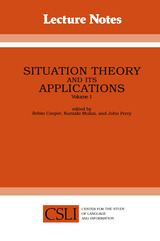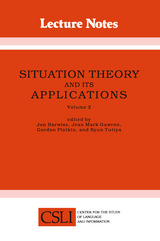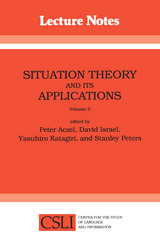3 books about Situation Theory

Situation Theory and Its Applications, Volume 1
Edited by Robin Cooper, Kuniaki Mukai, and John Perry
CSLI, 1990
Situation Theory grew out of attempts by Jon Barwise in the late 1970s to provide semantics for "naked-infinitive" perceptual reports such as 'Claire saw Jon run'. Barwise's intuition was that Claire didn't just see Jon, an individual, but Jon doing something, a situation. Situations are individuals having properties and standing in relations. A theory of situations would allow us to study and compare various types of situations or situation-like entities, such as facts, events and scenes.
One of the central themes of situation theory is that a theory of meaning and reference should be set within a general theory of information, one moreover that is rich enough to do justice to perception, communication and thought. By now many people have contributed to the development and application of situation theory, constrained by the need to account for certain kinds of semantic phenomena, and by the need to give a rigorous mathematical account of the principles of information that underwrite the theory.
This volume presents work that evolved out of the First Conference on Situation Theory and Its Applications held by CSLI at Asilomar, California, in March 1989. The nineteen papers included here fall into three categories. Those in Part I explore logical and mathematical issues that arise within situation theory. The papers in Part II connect situation theory with other approaches to logical issues, while those in Part III apply various version of situation theory to a number of linguistic issues.
[more]

Situation Theory and Its Applications, Volume 2
Edited by Jon Barwise, Jean Mark Gawron, Gordon Plotkin, and Syun Tutiya
CSLI, 1991
Situation theory is the result of an interdisciplinary effort to create a full-fledged theory of information. Created by scholars and scientists from cognitive science, computer science, AI, linguistics, logic, philosophy, and mathematics, the theory is forging a common set of tools for the analysis of phenomena from all these fields.
This volume presents work that evolved out of the Second Conference on Situation Theory and its Applications. Twenty-six essays exhibit the wide range of the theory, covering such topics as natural language semantics, philosophical issues about information, mathematical aplications, and the visual representation of the information in computer systems.
Jon Barwise is a professor of philosophy, mathematics, and logic at indiana university in Bloomington. Jean Mark Gawron is a researcher at SRI International and a consultant at Hewlett-Packard Laboratories. Gordon Plotkin is a professor of theoretical computer science at the University of Edinburgh. Syun Tutiya is in the philosophy department at Chiba University in Japan.
Center for the Study of Language and Information- Lecture Notes, Number 26
[more]

Situation Theory and Its Applications, Volume 3
Edited by Peter Aczel, David Israel, Stanley Peters, and Yasuhiro Katagiri
CSLI, 1993
These essays evolved from research presented at the Third International Conference on situation theory and its applications.
Situation Theory is the result of an interdisciplinary effort to create a full-fledged theory of information. Created by scholars and scientists from cognitive science, computer science and AI, linguistics, logic, philosophy, and mathematics, it aims to provide a common set of tools for the analysis of phenomena from all of these fields. The research presented in this volume reflects a growing international and interdisciplinary activity of importance to many fields concerned with the information.
Peter Aczel is professor of mathematical logic and computer logic at Manchester University. David Israel is a senoir computer scientist in the Artificial Intelligence Center at SRI International abd a consulting professor in the Philosophy Department at Stanford University. Yasuhiro Katagiri is a research scientist in the Information Science Research Laboratory of NTT Basic Research Laboratories. Stanley Peters is professor of linguistics and symbolic systems at Stanford University.
[more]
READERS
Browse our collection.
PUBLISHERS
See BiblioVault's publisher services.
STUDENT SERVICES
Files for college accessibility offices.
UChicago Accessibility Resources
home | accessibility | search | about | contact us
BiblioVault ® 2001 - 2024
The University of Chicago Press









